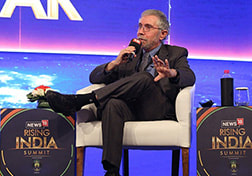
NEW DELHI - Criticising US President Donald Trump for his protectionist policies, Nobel Laureate Paul Krugman on Saturday accused him of not taking his job seriously and warned these measures lead to "risks of a disruptive trade war". "He (Trump) does not take the job seriously. He doesn't say to himself that I am the most important official in the world, I have better do my homework for understanding the issue...

"He just goes that these are my gut feelings and hires people who make him feel good...that is a frightening prospect," Krugman said at the News18 Rising India Summit here in response to a query on his perception of Trump.
On economic issues Trump's gut feelings are "protectionist" and his views of America were "50 years out of date", said the prominent economist.
"He wants America a heavy industrial country in the way it was when he was a young man. That is not just going to happen but he attempts to make it happen, which is extremely disruptive to America and to the global as a whole," he added.
Krugman said he was till recently optimistic that Trump's protectionist policies would not see the light of the day.
"Until about two weeks ago, I was quite optimistic that it would not happen. The reason was not because the President would get good economic advice but because the US businesses are invested in a globalised economy. All the investments the businesses have made is based upon the assumptions that the open trading system would continue.
"There is an enormous amount of fiscal capital and a large number of jobs are dependent on these value chains," he said
Krugman said he had "assumed the influence of these business communities would be sufficient... that it would not happen".
"I am less optimistic now...we have seen reasonably sensible Economic Council Head was fired, completely irrational tariff (was) imposed on steel and aluminium." According to him, the immediate issue is going to be a confrontation not with China, but with Europe as the "steel tariffs" will hit the continent. He said there are possible risks of a "disruptive global trade war".
He explained the European countries act collectively as the European Union on trade and there could widespread retaliation against US products. Also the possibility of falling relations on trade between the US and Asian countries including China becomes large, he said. On the Chinese economy he said: "China is a financial crisis waiting to happen. China is an unbalanced economy...the country is sustaining itself with a credit bubble that is waiting to burst...There is a significant risk of a Chinese bubble burst."
He also criticised the "strongman rule" in China.
Responding to query on reverse trend of localisation from globalisation, he said the possibility of this transformation is real and it had happened earlier but did not work out well. Elaborating on the environmental footprint, he said shipping of goods is not a major source of greenhouse gases but coal-fired power plants are the major contributors, followed by private transportation.
On economic issues Trump's gut feelings are "protectionist" and his views of America were "50 years out of date", said the prominent economist.
"He wants America a heavy industrial country in the way it was when he was a young man. That is not just going to happen but he attempts to make it happen, which is extremely disruptive to America and to the global as a whole," he added.
Krugman said he was till recently optimistic that Trump's protectionist policies would not see the light of the day.
"Until about two weeks ago, I was quite optimistic that it would not happen. The reason was not because the President would get good economic advice but because the US businesses are invested in a globalised economy. All the investments the businesses have made is based upon the assumptions that the open trading system would continue.
"There is an enormous amount of fiscal capital and a large number of jobs are dependent on these value chains," he said
Krugman said he had "assumed the influence of these business communities would be sufficient... that it would not happen".
"I am less optimistic now...we have seen reasonably sensible Economic Council Head was fired, completely irrational tariff (was) imposed on steel and aluminium." According to him, the immediate issue is going to be a confrontation not with China, but with Europe as the "steel tariffs" will hit the continent. He said there are possible risks of a "disruptive global trade war".
He explained the European countries act collectively as the European Union on trade and there could widespread retaliation against US products. Also the possibility of falling relations on trade between the US and Asian countries including China becomes large, he said. On the Chinese economy he said: "China is a financial crisis waiting to happen. China is an unbalanced economy...the country is sustaining itself with a credit bubble that is waiting to burst...There is a significant risk of a Chinese bubble burst."
He also criticised the "strongman rule" in China.
Responding to query on reverse trend of localisation from globalisation, he said the possibility of this transformation is real and it had happened earlier but did not work out well. Elaborating on the environmental footprint, he said shipping of goods is not a major source of greenhouse gases but coal-fired power plants are the major contributors, followed by private transportation.

 RSS Feed
RSS Feed
